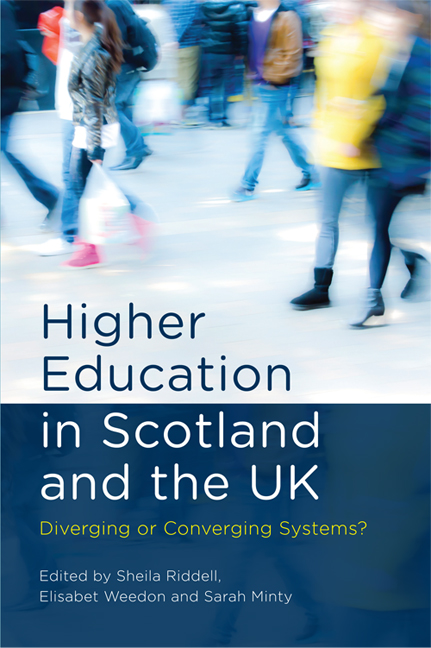Book contents
- Frontmatter
- Contents
- Figures
- Tables
- Acknowledgement
- The Contributors
- Dedication
- 1 Scottish Higher Education and Devolution
- 2 Higher Education Governance and Institutional Autonomy in the Post-devolution UK
- 3 Student Funding in the UK: Post-Devolution Scotland in a UK Context
- 4 Young People–s Attitudes towards Student Debt in Scotland and England
- 5 Cross-border Flows of Students within the UK
- 6 Widening Access to Higher Education in Scotland, the UK and Europe
- 7 The Internationalisation of Higher Education in Scotland and the UK
- 8 Research Policy in Scotland and the Rest of the UK
- 9 Devolution and Higher Education Policy: Negotiating UK and International Boundaries
- Appendix 1 Research Methods
- Appendix 2 List of Acronyms
- Index
8 - Research Policy in Scotland and the Rest of the UK
Published online by Cambridge University Press: 05 August 2016
- Frontmatter
- Contents
- Figures
- Tables
- Acknowledgement
- The Contributors
- Dedication
- 1 Scottish Higher Education and Devolution
- 2 Higher Education Governance and Institutional Autonomy in the Post-devolution UK
- 3 Student Funding in the UK: Post-Devolution Scotland in a UK Context
- 4 Young People–s Attitudes towards Student Debt in Scotland and England
- 5 Cross-border Flows of Students within the UK
- 6 Widening Access to Higher Education in Scotland, the UK and Europe
- 7 The Internationalisation of Higher Education in Scotland and the UK
- 8 Research Policy in Scotland and the Rest of the UK
- 9 Devolution and Higher Education Policy: Negotiating UK and International Boundaries
- Appendix 1 Research Methods
- Appendix 2 List of Acronyms
- Index
Summary
INTRODUCTION
Across the developed world, the UK is at the forefront of creating a competitive and marketised research system, driven by the belief that this will contribute to the overall effectiveness and efficiency of universities and the wider economy. UK Government pronouncements highlight the success of science and research policy, noting, for example, that ‘the UK is already the most productive country for research in the G8 – both in terms of publications and citations per unit spend’ (BIS, 2014: 5). The Scottish Government has made similar bold statements about the excellence of Scottish universities; for example, the White Paper on independence noted that ‘when adjusted for population, Scotland has more universities in the Times Top 200 world universities per head of population than any other country’ (Scottish Government, 2013: 7). Over the last two decades, research policy has had a profound impact on university values and ideology, since, particularly in research-intensive universities, staff have been compelled to adopt the guise of ‘academic capitalists’ in order to advance their careers and secure funding for their research (Henkel and Kogan, 2010). Universities have embraced the entrepreneurial research agenda on the grounds that independently earned income provides a certain degree of freedom from ‘state dependence’, although the majority of research income continues to come from government sources, with the Research Councils funding a third of all activity. At the same time, it is evident that efforts by the state to control research activity have intensified, driven by a range of mechanisms including research assessment initiatives designed to concentrate funds in particular institutions, the prioritisation of specific research programmes and themes often linked to business and economic agendas, and the promotion of knowledge exchange and impact activities to ensure that funded research produces practical social and economic benefits.
The broad approach to university research in Scotland, and the extent to which this differs from UK research policy, is the central focus of this chapter. We discuss the way in which research featured in the referendum debate, noting areas of agreement and disagreement between the Scottish and UK Governments and the universities.
- Type
- Chapter
- Information
- Higher Education in Scotland and the UKDiverging or Converging Systems?, pp. 128 - 140Publisher: Edinburgh University PressPrint publication year: 2015



